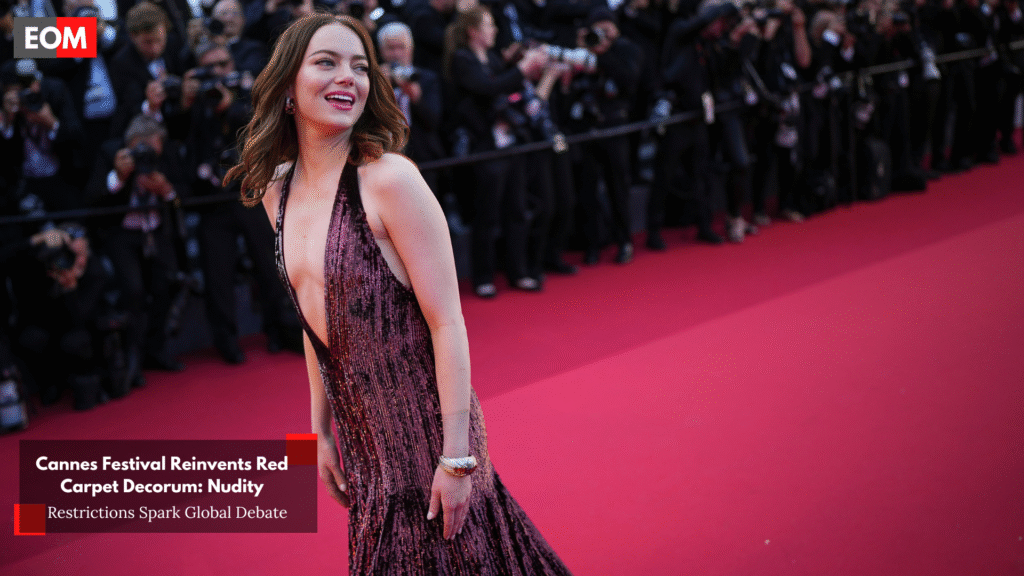Cannes Festival Reinvents Red Carpet Decorum: Nudity Restrictions Spark Global Debate

Cannes, France – July 2025
In a bold and controversial move, the Cannes Film Festival has introduced a new red carpet dress code banning nudity and graphic attire, a policy shift that signals a return to traditional notions of elegance and decorum. The decision comes in the wake of rising tensions between fashion freedom and institutional standards, following recent high-profile appearances that pushed the boundaries of red carpet fashion.
The rule change follows global backlash after Ye (formerly Kanye West) and Bianca Censori appeared at the 2025 Grammy Awards in outfits many deemed excessively provocative. Censori’s sheer, barely-there look generated both admiration and criticism—fanning a heated debate around what is acceptable on public platforms.
Elegance Over Shock Value: Cannes Draws a Line
Traditionally revered for its emphasis on cinematic artistry and sartorial sophistication, Cannes is reasserting its brand identity as a celebration of culture—not spectacle. Festival organizers released a statement emphasizing their commitment to “cinematic excellence and refined taste,” noting that nudity and explicitly revealing attire will no longer be allowed on the red carpet.
“Cannes represents cinematic heritage,” said a festival spokesperson. “We believe elegance should lead—not sensationalism.”
The updated policy includes guidelines that prohibit see-through clothing, visible nudity, and attire designed solely to provoke attention. Attendees will be required to conform to these expectations in order to walk the red carpet, regardless of celebrity status or designer affiliations.
Industry Reaction: Restriction or Reset?
The announcement has triggered mixed reactions across the fashion and entertainment industries. Traditionalists and cultural commentators have welcomed the move, calling it a necessary step toward restoring the red carpet’s cultural credibility. Others see it as an overreach that risks silencing creative expression.
Fashion designers, stylists, and celebrities known for their avant-garde aesthetic worry the new dress code may stifle individuality and innovation.
“Fashion is storytelling,” said New York-based stylist Alina Cortez. “To limit it on one of the world’s most iconic platforms could alienate artists who view clothing as part of their voice.”
At the center of the controversy is Bianca Censori, whose high-profile fashion choices—often minimalist, futuristic, and skin-baring—have made her both a fashion icon and a lightning rod for criticism. Her Grammy appearance, which broke the internet, exemplifies the clash between viral fashion moments and traditional red carpet values.
A Global Precedent for Other Festivals?
Cannes’ decision may not remain an isolated one. Insiders suggest that film festivals in Venice, Berlin, and Toronto are closely watching public and industry reaction. As red carpet appearances increasingly dominate social media, organizers of these events may seek to reclaim control over the image and ethos of their brands.
Cannes officials insist the dress code is not aimed at any individual, but its timing and context leave little room for doubt. It appears to be a direct response to a growing perception that fashion antics are eclipsing the purpose of the festival: celebrating cinema.
The Bigger Question: Expression vs. Etiquette
The Cannes policy reopens a fundamental debate in cultural circles: Where does personal expression end and public responsibility begin? Are red carpets platforms for avant-garde art—or should they preserve a certain aesthetic tied to history, tradition, and decorum?
As Cannes charts a stricter path forward, the global industry may be forced to reckon with this evolving tension. What remains clear is that the red carpet is no longer just about the films or the stars—it’s a cultural battlefield where fashion, fame, and formality collide.

